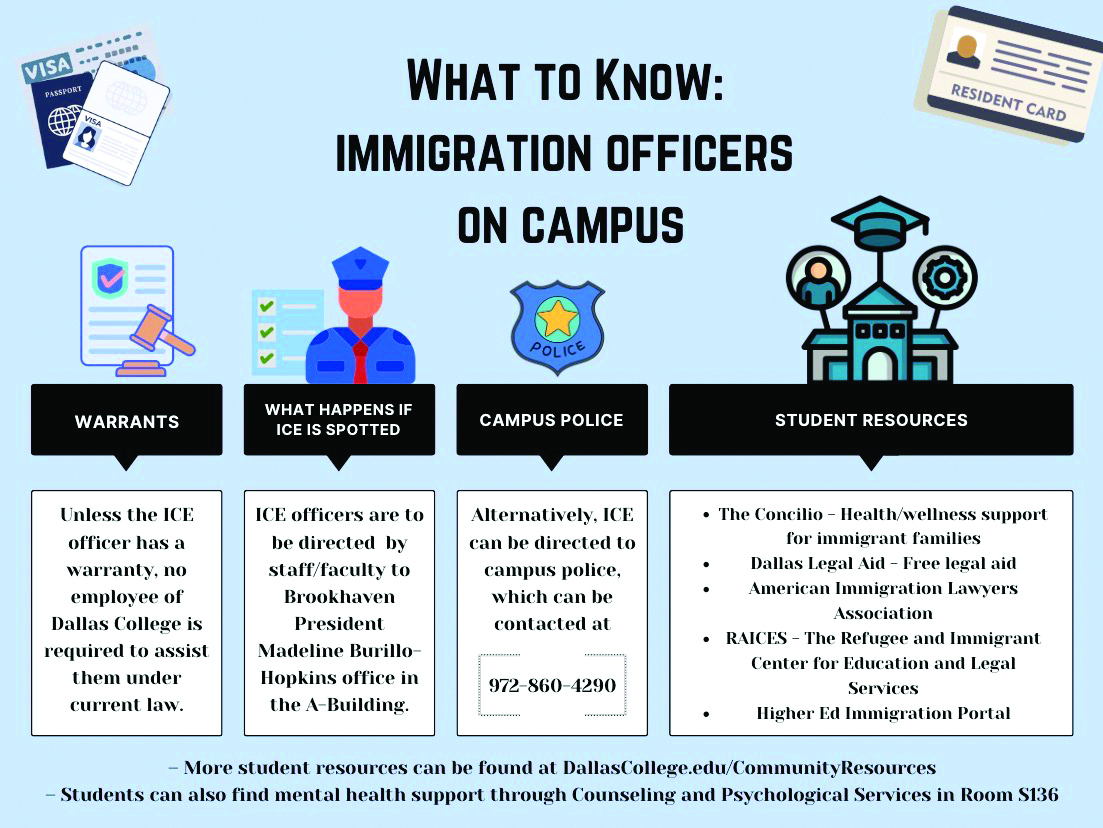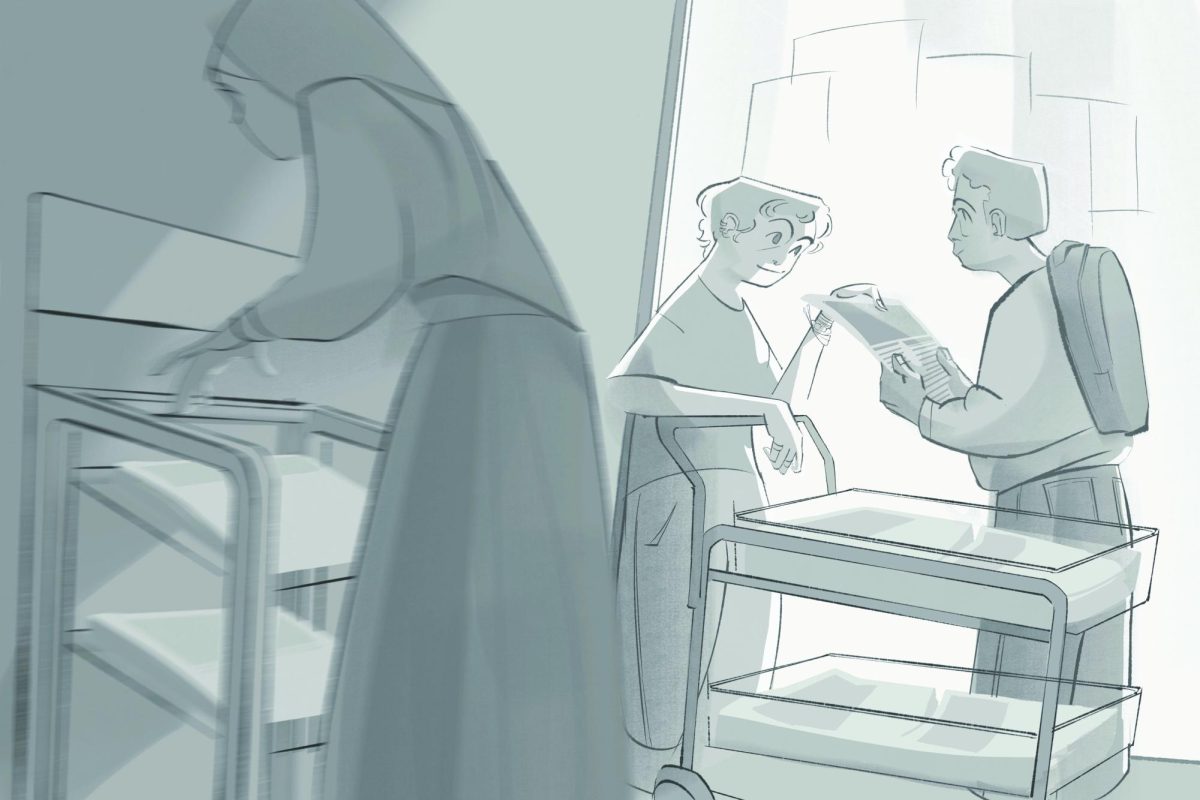During the last presidential race, Donald Trump and JD Vance told citizens that they will have stricter immigration laws. According to Hunton.com, on Jan. 21, the Department of Homeland Security got rid of a policy established during the Biden-era, in which schools/colleges, hospitals and places of worship were “protected areas.” Meaning, immigration officers were supposed to avoid these spaces.
Given these new circumstances, Dallas College has established an official protocol for staff and faculty to follow if an immigration officer is spotted on campus. “I think that there may be some students who choose not to come to campus very much just because they’re concerned, and I understand that,” Adrien Cueller-McGuire, president of the Brookhaven campus Faculty Association, said. “… I think it’s a very real possibility that [immigration can] come to campus, [but] I hope it doesn’t happen – and I hope that students will still come to campus, still get the education that they’re paying for, that’s so important.”
According to Cueller-McGuire and the district email sent by Dallas College, if an immigration officer is spotted on campus and/or goes to a classroom, faculty and staff have been advised to direct the officer to Brookhaven President Madeline Burillo-Hopkins office in the A Building. Afterwards, Burillo will alert campus police to escort the immigration officer(s) around campus.
It should also be noted that in one of the emails, Dallas College also said that “under current law, no employee of Dallas College is required to assist federal immigration authorities… absent a warrant.”
If the officer does not want to comply by going to Burillo’s office, the faculty/staff member is advised to call campus security at 972-860-4290. Cueller-McGuire recommended to all members of the Faculty Association to save the campus police’s number in their cell phones. “It would be better than [using] the panic buttons now on the phones there [in the classrooms],” she said. “That kind of heightens the situation for them, because they feel like, ‘Oh no, something’s really wrong,’ and I think it’s very important that we all stay calm, especially for the students, so that they’re not more upset than they might be.”
According to NPR, Trump complained that the issue with immigration under the Biden-era was that Biden allowed a high number of migrants “committing crimes” into the country. Adjunct instructor of government in the School of Law and Public Policy and local attorney David Griggs said that the previous administration was trying to enforce the U.S. asylum laws, which allows individuals who are escaping from political unrest or from serious factors, such as gangs that they need to escape from, to apply for asylum in the country.
During the Trump administration’s first round, they tried to impose a requirement that those previously mentioned immigrants stay in Mexico, under Title 42 – which the Biden administration eliminated, going back to the original immigration laws. However, Trump’s current administration is now wanting to bring that previous policy from 2016 back.
“It’s just a difference of philosophy as to how you want to approach it,” Griggs said. “… We’ve always been known as a country that accepted immigrants. We have a Statue of Liberty that basically says, ‘we welcome you to come here and start a new life…’ so it does go against the image of America for us to have such a strict policy… we need to have comprehensive immigration reform passed by Congress, and it needs to include all aspects of the immigration question, because part of the system is broken. There’s no doubt, but we can fix it if we can bring the parties together to work on a compromise. The problem is that the two parties are far apart on what they believe is the solution.”
Due to Immigration and Customs Enforcement being allowed in “safe spaces” that they were previously barred from, concern has been raised throughout the country by many people – including those on the Brookhaven campus.
“Let me say this, much of this is vibrato, meaning that it is an attempt to try to scare people,” Griggs said. “They may not ultimately go that far in trying to ‘round up all the immigrants,’ that may not happen. But unfortunately, it’s going to put a fear in a lot of people, especially those who are undocumented.”
Lilian Cordero Lopez, an international student from Mexico at Dallas College, said that while she is not undocumented, she is still worried for people in her network that may not share the same status. “I try to isolate myself a lot from the outside world to avoid… bad experiences,” Lopez said. “Personally, I’ve been… feeling so hopeless and helpless and just feeling like my hands are tied.”
Lopez also said that as someone with brown skin, Native American facial features and Spanish as her first language, she fears that other factors such as racial profiling will contribute to further tension and make people with attributes like her “walking targets.”
“I can’t change who I am,” Lopez said. “No matter how much I do, that’s never going to change… there’s nothing I can do about it. I shouldn’t be doing anything to take away my identity, who I am. I shouldn’t be hiding who Lilian is, because I was born this – I will die this Mexican with brown skin, Native American facial features, Spanish as a mother tongue. That’s who I am… that’s forever me.”
Griggs said that while he doesn’t think students should have to worry if they do not have a criminal record, as the administration claims they are targeting “migrants with a criminal record,” he still recommends to the community to remain vigilant.
“You would probably want to get an attorney very quickly [and] not say a lot of things to the officers, especially if you have anything to hide, but cooperate,” Griggs said. “I’m also an attorney, so I know that the best way to deal with that is to fight it in court… if a student has a felony and they are undocumented, that might be more cause for concern, but just average students who are here on an f1 visa, I don’t think that there’s anything to worry about.”
Griggs, Cueller-McGuire and Lopez all acknowledge that these concerns with ICE may take a mental toll on students and advise them to reach out to Dallas College counselors for help and resources. “Prioritize your mental health, look for help,” Lopez said. “With the counselors at Dallas College, if you need them, reach out to them, because they are there for us. Don’t hesitate if you feel like you might need them… [because] it probably means that you do need them.”









